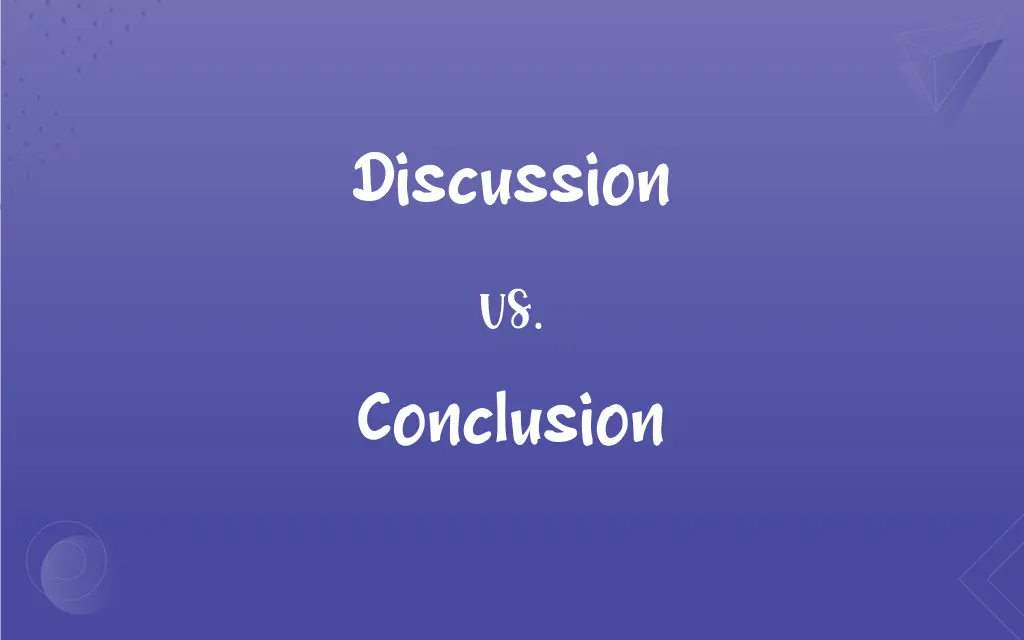Discussion vs. Conclusion: What's the Difference?
Edited by Aimie Carlson || By Harlon Moss || Updated on November 8, 2023
A discussion is an exchange of ideas or debate, while a conclusion is the final judgment or decision reached after consideration.

Key Differences
A discussion is a process of talking about something in order to reach a decision or to exchange ideas. It often involves multiple perspectives and is not necessarily intended to reach an immediate agreement or decision. A conclusion, by contrast, is the end point of an argument or process, representing a final decision or judgment that is reached after considering all the information presented during the discussion.
In the context of a meeting or dialogue, a discussion allows participants to present and argue different points of view, ask questions, and build upon others' ideas. The conclusion of such a meeting would be the final decision or action agreed upon after considering the points raised during the discussion.
When writing or speaking, a discussion section explores different aspects of a topic, often without a definitive stance. The conclusion section, however, summarizes the main points made and provides a clear answer or stance, tying together all threads of argumentation.
Academically, a discussion in a paper or article analyzes findings, presents interpretations, and may acknowledge limitations. The conclusion, on the other hand, succinctly reviews the main contributions of the work, restates the thesis or main finding, and may suggest directions for future research.
The purpose of a discussion is to explore and deliberate, facilitating understanding or progress on a topic. The purpose of a conclusion is to provide closure, wrapping up the discourse with a final, coherent statement or recommendation based on the discussion.
ADVERTISEMENT
Comparison Chart
Purpose
To exchange ideas, debate, and deliberate
To provide a final decision or judgment
Role in Communication
To facilitate understanding and exploration
To offer closure and summary
Nature
Ongoing and open-ended
Final and definitive
Occurrence
Throughout the dialogue or process
At the end of the dialogue or process
Outcome
May or may not reach a decision
Represents a decision or final statement
ADVERTISEMENT
Discussion and Conclusion Definitions
Discussion
The action or process of talking about something to reach a decision or to exchange ideas.
The committee had a long discussion before voting on the proposal.
Conclusion
A judgment or decision reached by reasoning.
Her conclusion after reading the studies was that the treatment was effective.
Discussion
A detailed treatment of a topic in speech or writing.
She contributed valuable points to the class discussion.
Conclusion
The summing up of an argument or text.
His essay had a strong introduction and a powerful conclusion.
Discussion
Consideration of a subject by a group; an exchange of views.
The discussion of the new policy lasted for two hours.
Conclusion
The end or finish of an event, process, or text.
The report's conclusion was that the project was successful.
Discussion
The act of talking about something with another person or a group of people.
They entered into a heated discussion about politics.
Conclusion
A final part of something, especially a period of time, an activity, or a story.
The conclusion of the festival was marked by a spectacular fireworks display.
Discussion
A conversation or debate about a specific topic.
The panel led a public discussion on climate change.
Conclusion
A final arrangement or agreement.
The conclusion of the negotiations resulted in a new trade agreement.
Discussion
Consideration of a subject by a group; an earnest conversation.
Conclusion
The close or last part; the end or finish
The conclusion of the festivities.
Discussion
A formal discourse on a topic; an exposition.
Conclusion
The result or outcome of an act or process
What was the conclusion of all these efforts?.
FAQs
Can a discussion happen without reaching a conclusion?
Yes, discussions do not always result in a conclusion.
Is a conclusion final?
Typically, yes; a conclusion is meant to provide a definitive end point.
Can a discussion lead to multiple conclusions?
Yes, discussions can lead to several different conclusions.
Is a conclusion always based on discussion?
Often, but not always; conclusions can also be reached independently.
Can there be a discussion within a conclusion?
A conclusion may summarize the discussion, but it is not the place for further debate.
Does a conclusion require evidence?
In a rational argument, yes, conclusions should be evidence-based.
Are all discussions productive?
Not necessarily; discussions can sometimes be unproductive or inconclusive.
Can a conclusion be changed?
Yes, conclusions can be revised with new evidence or insight.
Is a discussion always formal?
No, discussions can be both formal and informal.
How long should a conclusion be?
A conclusion should be concise and only as long as needed to summarize and close the discussion.
What makes a good conclusion?
A good conclusion clearly summarizes the main points and provides a definitive end to the discourse.
Can there be a discussion after the conclusion?
After a formal conclusion, any further discussion would typically be a new or related topic.
Do discussions always involve more than one person?
Usually, but one can also engage in self-reflection as an internal discussion.
Can a discussion have a conclusion?
Yes, a discussion can lead to a conclusion.
Is a discussion necessary for a good conclusion?
While not always necessary, a good discussion often enhances the quality of the conclusion.
Is the conclusion the same as the summary?
A conclusion is a type of summary that specifically provides closure.
Can a discussion be part of the conclusion?
No, the discussion should be separate, leading up to the conclusion.
Are conclusions only used in writing?
No, conclusions are used in both speech and writing.
What makes a good discussion?
A good discussion involves clear communication, open-mindedness, and thorough consideration of different viewpoints.
Can discussions be part of written texts?
Yes, discussions can be written, as in articles or books.
About Author
Written by
Harlon MossHarlon is a seasoned quality moderator and accomplished content writer for Difference Wiki. An alumnus of the prestigious University of California, he earned his degree in Computer Science. Leveraging his academic background, Harlon brings a meticulous and informed perspective to his work, ensuring content accuracy and excellence.
Edited by
Aimie CarlsonAimie Carlson, holding a master's degree in English literature, is a fervent English language enthusiast. She lends her writing talents to Difference Wiki, a prominent website that specializes in comparisons, offering readers insightful analyses that both captivate and inform.
































































